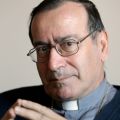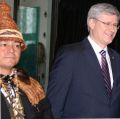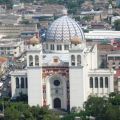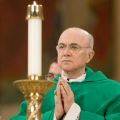NEWS
Spiritans lose a ‘brilliant person’ in Fr. Graham
By Vanessa Santilli-Raimondo, The Catholic RegisterTORONTO - Spiritan Father Edward Graham, who taught for many years in Spiritan schools, passed away Jan. 26 at the age of 88. He was in his 62nd year of the priesthood with the Spiritans.
“He was a brilliant person,” said Fr. Paul McAuley, a fellow Spiritan who had known him for about 30 years. “He was very kind and lived very simply.”
Politicians can't just shed their faith
By Luc Rinaldi, The Catholic RegisterTORONTO - The separation of church and state is a concept engrained in the identity and culture of Western democracy as a means of protecting religion, not eliminating it, according to the Very Rev. Lois Wilson.
But that definition has become less and less believable, Wilson told a few dozen young adults gathered in downtown Toronto at a Theology on Tap event that questioned what role religion should play in forming the public policy of a secular state.
Lapsed Catholics invited to take another look
By Pat Byrne Casey, Canadian Catholic NewsMAPLE RIDGE, B.C. - St. Luke’s parish in Maple Ridge recently invited 8,200 people, give or take a few thousand, to dinner.
That number, says a media release from their office, represents the one-fifth of the local population who are lapsed Catholics.
“Those of us who live our faith take great comfort in it,” said Vernon Robertson, a parishioner and the organizer of the event, a “full meal deal” entitled Discovering Christ.
Bishop says world must help rebuild 'functioning authority' in Somalia
By Barb Fraze, Catholic News ServiceWASHINGTON - The international community must contribute to reconstructing a "functioning authority" in Somalia, said the bishop who serves as administrator of the country's only Catholic diocese.
After 21 years of "practically anarchy," Somalia "has become a failed state, a black hole," said Bishop Giorgio Bertin of Djibouti, who took over as administrator of the diocese in neighboring Somalia in 1989, when the bishop of Mogadishu was killed.
Crown, First Nations’ covenants must be retained
By Deborah Gyapong, Canadian Catholic NewsOTTAWA - The historic Crown-First Nations Gathering revealed stark differences on how the relationship between Canada’s founding peoples and the government, embodied in the Indian Act, should continue.
And whatever is resolved, an advisor to the Catholic Church said, must re-affirm historic treaties signed between the two.
It is about recognizing the sacred importance of covenants, said Gerry Kelly at the one-day gathering held in Ottawa Jan. 24. Kelly is the former director of the Canadian Conference of Catholic Bishops’ secretariat on aboriginal affairs and now advises Catholic entities regarding the Indian Residential Schools legacy.
“Our whole understanding of our relationship with God is understood scripturally in terms of covenants,” said Kelly. “We understand what it means. A covenant is sacred. We can’t hold that position and not recognize the covenant relationship established by treaties. It is timeless and it is binding.”
Assembly of First Nations National Chief Shawn Atleo called the Indian Act “a breach” of the government’s commitment to First Nations peoples that was “built on a disgraceful premise of our inferiority.”
“It is well past time that we began to undo the damage that Act has inflicted on our peoples, and to our partnership,” Atleo said, noting it formed the basis for the reserve system, residential schools and prohibitions of spiritual and cultural practices.
Prime Minister Stephen Harper, however, promised an incremental approach to remedying some problems inherent in the Act, but bluntly stated his government had “no grand scheme to repeal or to unilaterally re-write the Indian Act.”
“After 136 years, that tree has deep roots. Blowing up the stump would just leave a big hole,” Harper told the more than 150 First Nations leaders at the gathering. “However, there are ways, creative ways, collaborative ways, ways that involve consultation between our government, the provinces and First Nations leadership and communities, ways that provide options within the Act, or outside of it, for practical, incremental and real change.”
The gathering was called to find ways to improve the relationship between Canada’s First Nations’ people and the federal government. It had been planned for some time, with the date finalized during the period in late 2011 when images of the poverty on Canada’s reserves were brought to the forefront with the poor housing conditions that plagued Attawapiskat in Northern Ontario.
Kelly said incremental approaches are not problematic in themselves.
“So much of this depends on good intentions and fairness,” he said. The challenge in the past has been with First Nations and bands being pressured “to give up their full rights for a limited parcel of rights.”
The other problems with an incremental approach are strictly practical, he said.
“The longer this process takes, the more resources are taken from First Nations lands in the context where their rights to resources and benefiting from those resources are ignored.”
Aboriginal entrepreneur and consultant David Acco, a Catholic and Montreal-based member of the Cree First Nation, said the gathering could not have taken place in the 1960s or ’70s with the kind of aboriginal inclusiveness of today. Aboriginal people have developed the leadership abilities and legal skills to put them in a better position to negotiate, he said.
Acco, president of Acosys Consulting, said a long-term vision is needed that takes into consideration how current negotiations will affect future generations.
“I don’t think aboriginal people are going to get another opportunity to right the wrongs of the past like we have now in another 100 years,” Acco said.
He also raised concerns about incremental approaches creating a hierarchy of “haves” and “have-nots” that will see some First Nations rewarded and others, like Attawapiskat, left behind. Communities like Attawapiskat need the Indian Act for their survival, Acco said, because of the fiduciary responsibility the Crown has to First Nations. An incremental approach decentralizes and potentially fragments any unity among First Nations, he said.
The gathering’s “outcome statement” affirmed principles in the Joint Action Plan the government and First Nations developed in June 2011 that included improving relationships and partnerships “respectful of aboriginal and treaty rights,” transparent and accountable governance, empowering success through education and opportunity, promoting self-sufficient communities and assisting economic development that will benefit all Canadians.
The statement called for immediate action on a renewed relationship that includes multi-year funding, improved financial accountability on the part of all with the goal of First Nations financial self-sufficiency. It affirmed an incremental approach to “removing barriers to First Nations governance,” by working around and through existing mechanisms in the Indian Act, which cannot be replaced overnight,”and committed both parties to “respect and honour our treaty relationship and advance approaches to find common ground on treaty implementation.”
Vatican, Palestinian leaders continue talks on church rights, freedoms
By Cindy Wooden, Catholic News ServiceVATICAN CITY - The Vatican and the Palestine Liberation Organization are continuing talks aimed at a formal agreement regulating and promoting the presence and activity of the Catholic Church in the Palestinian territories.
Vatican and PLO representatives met Jan. 28 at the headquarters of the Palestinian president in Ramallah, according to a statement released at the Vatican Jan. 30.
In San Salvador, vets continue long tradition of occupying cathedral
By Edgardo Ayala Catholic News ServiceSAN SALVADOR - A group of former guerrillas has spent more than two weeks in San Salvador's Metropolitan Cathedral to demand better economic conditions, continuing a long tradition of the cathedral as a place to expose perceived injustices.
The veterans of the Farabundo Marti National Liberation Front began their occupation Jan. 12, demanding that President Mauricio Funes meets previously agreed-upon arrangements, such as the inclusion of parents of combatants killed in action into the pension system.
French president rejects calls for secular values to be in constitution
By Catholic News ServicePARIS - French President Nicolas Sarkozy rejected calls for secular values to be enshrined into his country's constitution and urged religious leaders to do more to spread their message in the country.
"A secular society is one which has decided to separate churches from the state, so the state doesn't have to account for its choices to churches, and churches don't depend on the state to live and organize -- this is secularity, a secular republic," he told religious leaders at a traditional New Year meeting Jan. 25.
Debate over Canada-US Keystone pipeline is far from over
By Dennis Sadowski, Catholic News ServiceWASHINGTON - President Barack Obama's decision to deny a permit for the 1,700-mile Keystone XL pipeline to carry Canadian crude oil to Gulf Coast refineries should have surprised no one, not even the project's staunchest supporters.
The president promised he would nix the permit after Congress inserted a deadline for his decision in the bill extending the middle class tax cut passed just before Christmas. In denying the permit, Obama said it was not because the project wasn't needed but rather that the 60 days he was given to make up his mind was far too short to complete a second environmental review of the pipeline route, including a 92-mile stretch through the ecologically sensitive Nebraska Sandhills.
Vatican downplays charges of financial 'corruption'
By Francis X. Rocca, Catholic News ServiceVATICAN CITY - Insisting on the Holy See's continuing commitment to transparency and rectitude in economic affairs, the Vatican's spokesman downplayed references to "corruption" in a letter apparently sent to Pope Benedict XVI by a Vatican official who is now apostolic nuncio to the United States.
Jesuit Father Federico Lombardi, director of the Vatican Press Office, criticized as "partisan," "partial and banal," an Italian television news program, which, on Jan. 25, broadcast portions of letters addressed to Pope Benedict and Cardinal Tarcisio Bertone, the Vatican Secretary of State.
Months after independence, South Sudan grapples with contentious issues
By Bronwen Dachs, Catholic News ServiceCAPE TOWN, South Africa - The church in South Sudan and its partners in North America are frustrated that their efforts to build peace in the infant country are threatened, but they have not given up, Catholic officials said.
A serious political deadlock between South Sudan and its northern neighbor, Sudan, over the split of oil revenues "could lead to a declaration of war," said Auxiliary Bishop Santo Loku Pio Doggale of Juba, capital of South Sudan.
Bishop Doggale said that he and other church leaders met with South Sudan President Salva Kiir and other senior government officials in Juba after the government announced Jan. 20 that it was shutting down oil production immediately.












